- Home
- Scott Westerfeld
Impostors Page 3
Impostors Read online
Page 3
She waves a hand, and the airscreen pops back on—Rafi on a newsfeed, smiling, posing with children in school uniforms in a hovering garden of snow. She looks confident and charming, not like someone murdering the local grammar.
My memories of that trip aren’t about schoolkids. I hid in our private suite while my sister and father met with famous people. Then I took her place in front of polite crowds, wearing vat-grown furs over body armor. Sniper bait in the snow.
Traveling isn’t much fun for me. Just as much hiding, a lot less space.
I flop back on my bed. “So it’s your fault for showing off.”
“It’s your fault for telling him you wanted to go!”
“What I say doesn’t matter.” I stare at Rafi, daring her to deny it.
She looks away. “Fine. It’s his fault. If people trusted him, the Palafoxes wouldn’t need a hostage.”
I can only shrug. That’s just the way it is—the way he is.
And the brave part of me that spoke up in front of our father really wants to do this.
Rafi doesn’t understand. She gets to charm people every day, making sure the citizens of Shreve love as well as fear us. But all my years of training have only been relevant for two minutes and four seconds—the time it took me to save her life.
“I need to do this, Rafi.”
Her answer is a whisper. “To help him? He doesn’t even see you.”
I turn away, stung again. These are things that she never says out loud.
“I want to feel useful.”
She sighs. “You don’t hate him as much as I do.”
This is an old accusation. But it’s easier for Rafi to hate our father—he recognizes her existence.
“I won’t be gone forever. Two months to secure the ruins, Dona says.”
“‘Secure the ruins’? If you want to fool the Palafoxes, at least stop talking like a military advisor.” Rafi goes to the window to glare down at the garden. “Why people are fighting over Rusty garbage is beyond me.”
“Everyone needs metal. We can’t go back to digging holes in the ground.”
“Because when the Rusties did, they almost destroyed the world,” she recites. “Maybe the pretty regime had the right idea. If everyone was still a bubblehead, there wouldn’t be all this fighting.”
I laugh at this, because she’s probably kidding.
The pretty regime ended just before Rafi and I were born. Back then, everyone had an operation when they turned sixteen. It made you beautiful, but also had a secret purpose—it changed the way you thought.
Pretties never questioned authority, always consumed their fair share of resources and no more. Cities used only the power generated by their solar footprint, and recycled every scrap of metal. The Rusty ruins were left alone, a strategic reserve, so that humanity would never have to strip-mine the earth again.
But then a girl called Tally Youngblood became the first rebel. She brought the pretty regime down, and suddenly everyone had to think for themselves. It was called the mind-rain, all those bubbleheads waking up at once. All those cities hungry and ready to expand.
Freedom has a way of destroying things.
People like our father seized power in the chaos. They began to build new structures, whole new cities, starting a race for metal. Now the ruins aren’t just reminders of the Rusties’ excesses—they’re invitations to start it all again.
Tally may be missing, but there are still rebels out there who think the ruins should be left alone.
“You’d hate being a bubblehead,” I argue. “They had brain damage!”
Rafi shrugs. “But they were happy all the time. They didn’t have to worry about getting shot at. They didn’t have wars.”
“They were too dumb to have wars!”
She shakes her head. “Repartee like that won’t impress your hosts.”
“I’ll just be quiet. They can’t make me be witty.”
“You think wit is your problem?” Rafi starts counting on her fingers. “You don’t know which designs everyone’s wearing. You don’t know the latest scandals—who doesn’t get invited to parties anymore, or why. You’ve never even had to change the subject in an awkward conversation!”
I stand up to look out the window of our room, my hands twitching.
“I love you, little sister,” Rafi says softly. “But you’re not normal. Instead of clothes and music, you talk about escape routes and improvised weapons. And you eat like a barbarian.”
She’s said all this before—that growing up as a body double made me different. But always fondly, because I wasn’t like her rich, bratty friends. The way she’s saying it now just makes me feel lonely.
The thing is, I can smile like Rafi, move like her, mimic her expressions. Read a speech from an eyescreen with her pauses and inflections. We even hoverboard with the same stance.
But I don’t know people like she does. She can talk to anyone—dignitaries, soldiers, randoms in a receiving line—with perfect ease. She has a hundred friends I’ve never really met. I’ve just memorized their faces so I know who to wave to on the dance floor. She has a whole life I’ve only seen slivers of, like I’m spying on a party through a keyhole.
Maybe that’s why I want to go to Victoria. To have my own party for once.
I stick out my lower lip. “I’ll just pout the whole time, and they’ll never know the difference. Two months is your average sulk.”
Rafi’s resting sulk face is my masterpiece, but she doesn’t even crack a smile.
“You have to be the perfect guest, Frey. It’s a disaster for both families if anyone figures out you’re a hostage.”
“Who’d believe it? I mean, has anyone ever done this before?”
“Not for about seven hundred years. Which you’d know if you’d read Machiavelli.” Her voice goes softer. “But this is Dad we’re talking about. Do you think maybe he …”
She hesitates, then whispers the magic words.
“Sensei Noriko.”
We go to the bathroom and turn on all the taps, loud and hot, steaming the room up in case of stray spy dust. We wait there silently, watching as the mirror fogs.
Sensei Noriko was Rafi’s etiquette tutor. She taught my sister all the subtle refinements I never needed to know—how to eat properly, how to use a fan, how to sit at a tea ceremony. She didn’t know about me.
Then, when we were nine, Rafi declared that my curtsying needed some serious work. So I pretended to be my sister for one lesson.
Noriko had an amazing eye for movement, and knew immediately that something was wrong with me. She was about to call Rafi’s head tutor, which would have only made things worse. So I admitted who I was—what I was.
Someone must have been watching, because Sensei Noriko never came to teach again.
Rafi and I were twelve before we ever said aloud what probably happened to her. Since then, the words Sensei Noriko remind us that our secrets are dangerous.
Once the steam is thick, Rafi leans close and whispers, “What if he planned this way back when we were born? Hiding you this whole time, in case he ever needed to guarantee a deal?”
A shudder goes through me.
On the newsfeeds outside our city, people always wonder if our father plans everything, or just makes it up as he goes along. Nobody can predict his next move, because he does things no one else would.
Like this hostage exchange. Like me.
But Rafi can’t be right.
“It’s because of our brother,” I say softly. “You know that.”
She looks away into the steam.
Before we were born, when the mind-rain was spilling across the world, our father was just another politician. But even back then, some people already thought he was dangerous.
Our brother, Seanan, was only seven years old. Someone—they never found out who—kidnapped him, trying to force Father to resign his council seat. When he refused, no one ever saw Seanan again.
So he raised me as a body double
, a last defense against the people who hate this family.
“That’s exactly what I mean,” Rafi says. “What if Dad’s setting up the same situation again? His child in someone else’s hands, so they think they can control him. Except they can’t. And this time, he can’t lose.”
I stare at her—he can lose.
He can lose me.
“Sending a hostage wasn’t his idea,” I hiss. “The Palafoxes insisted on it!”
Rafi raises an eyebrow. It’s one expression of hers I’ve never been able to master—wary and wise. She leans forward.
“And who told you that, little sister?” she whispers in my ear.
The next month is a blur.
Language lessons. Dance lessons.
Lessons on the history of the mind-rain. On the Palafoxes, and how they rose to become the first family of Victoria. On the nature-loving rebels who try to keep them from salvaging the Rusty ruins nearby.
Riding lessons. What-to-wear-for-dinner lessons.
How to talk to serving drones. How to ping a heartfelt apology. The polite ways to block surveillance in someone else’s home. Lessons on small talk, body language, giving clever toasts at dinner parties. And, of course, which forks to use when. (Turns out, I do eat like a barbarian.)
I never realized my sister had to work so hard, to know so much. And all of it on top of being trained how to escape from an unfamiliar city and get home through the wilderness, in case something goes wrong with our father’s deal.
It leaves me too tired to worry about being separated from Rafi and my pulse knife. About being an impostor for two months.
Tired as I am, my big sister and I stay awake the night before I leave.
“You can’t get assassinated while I’m not here to save you,” I tell her. “It’s not allowed.”
Rafi rolls her eyes at me, angles away on her hoverboard. “Not much chance of that. While you’re off having adventures, I’ll be stuck here, hiding!”
“For two whole months?” I catch up with her, making sure she sees my shocked face. “How will you survive?”
She doesn’t get the joke. Or doesn’t show it.
We reach the edge of our father’s property, where the clear-cutting stops and the forest rears up like a dark tsunami.
Rafi doesn’t slow down, plunging into the upper branches. She banks hard right, dodging through the trees, keeping low on her board so the garlands of kudzu don’t knock her off.
I follow, knees bent, keeping close watch on the lights on my board. We have to stay at the edge of the forest, where our lifters can keep hold of the property’s magnetics.
Branches lash my face and hands. I set my eyescreen to night vision, and Rafi becomes a zigzag of body heat against the cool blue forest. When we whip hard around a tree trunk, my crash bracelets purr on my wrists—they think I’m about to fall.
A flock of birds scatters before Rafi’s approach, pearly white in night vision. We climb through the flutter-storm of their wings, reaching the limit of our lifters just as the treetops open onto sky.
Rafi comes to a trembling halt.
“Careful.” I point down—only one light flickers on her board.
She doesn’t look. Her eyes are on our home, a black tower in the flat sea of manicured gardens and softly lit pathways. A couple of security drones bob on the horizon, keeping watch on us, on the forest.
“You’re the one who has to be careful, little sister.”
“I’ll be fine.” I reach out and pull her closer to the property. Another light sputters to life on her board. “I’ve trained for this my whole life.”
“You’re loving this.” Her voice is bitter. “You want to get away from me.”
“I hate leaving you, Rafi. But I’m totally done with all this training. All that stuff you know is boring.” This doesn’t convince her, so I add a little of the truth. “Maybe it’ll be nice, living out in the open for a while. You’ll see what it’s like for me, hiding all the time.”
Rafi lets her board drift closer, reaches out to take my shoulders. “When I’m in charge, you won’t have to hide.”
My mouth goes dry. This is something she’s never said before. It’s not something I think about.
But our father’s on his second round of life extension, when even the best crumbly surge starts to crack around the eyes.
Hard as it is to believe, he has to die sometime.
“I’ll tell the whole city about you.” Rafi’s voice is the barest whisper, even though there’s no spy dust out here over the forest. “I’ll explain how it was you waving to the crowds. That you were the brave one when the assassin tried to kill us.”
I manage a smile. But the thought of everyone knowing our secret makes my stomach clench.
“Won’t they be mad at us for tricking them?”
She shakes her head. “It’s not our fault.”
A weight lifts from me, like it does every time she says that.
Maybe I won’t always be one of our father’s deceptions.
“I’m going to give you something,” Rafi says. “My cyrano.”
“Already got one.” I’ve been training with it, learning to listen to the quiet prompts without looking distracted. It sits in my ear, helping with etiquette and putting names to faces. It even corrects my irregular verbs.
“Not like this one.” With a tug, she pulls a glistening curve of metal from behind her ear.
I frown. “Mine’s a lot smaller.”
“Yeah, but mine’s smarter. It scans the news, makes assessments, translates on the fly. In the wild, it can pick up satellite feeds.” Rafi smiles. “But it’s totally passive. Never transmits. No one will ever spot that it’s there.”
She hands the cyrano to me. It’s warm in my hand.
“How come you never told me about this?”
“I mostly don’t wear it.” She breathes out through her teeth. “It’s only got one voice setting. It sounds like him.”
I almost drop the cyrano, let it fall down into the darkness of the trees. But this is the only way Rafi has of protecting me.
“Thank you.” It curls up behind my ear, warm and buzzing.
“Just come home,” she says.
We stay there all night above the trees, fragile on our trembling hoverboards, talking about how things will change when he’s gone.
Five hovercars full of soldiers take me to Victoria.
They aren’t city cars, flying on silent magnetics. They’re military grade, with lifting fans to keep their armored bulk in the sky. The engine roar drowns out everything inside the cabin, and our rotor wash incises the desert below, a traveling sandstorm.
You’re late for an appointment, my father’s voice whispers in my ear. Lunch with the Palafoxes.
It’s just Rafi’s cyrano, but it startles me. I hardly slept last night.
My clothes feel wrong on my body. I’ve dressed like Rafi a thousand times before, but it’s different without her sitting here next to me. Like they’re really my clothes now.
Why are we late?
I turn to the soldier in the next jumpseat. She’s taller than me, broad across the shoulders, her body surged into a fighting machine.
The cyrano reminds me her name:
Sergeant Tani Slidell. She commands this unit.
“Shouldn’t we be there by now?” I yell over the engine noise.
She glances to the right—checking an eyescreen.
“Eight minutes, miss. We’re taking a detour over the ruins.”
I look out the closest window, a rectangle of ten-centimeter-thick ferroglass. The mountains are to the west, bright red in the high sun.
The rebels hide in those mountains, always watching the ruins for opportunities to harry and attack the Palafoxes’ salvage operations. The point of traveling in force was to get me to Victoria safe and quick.
“Why the detour?” The engine vibration rattles my voice.
“Orders, miss. A little recon.”
I twitch eve
ry time they call me miss. No one on this trip—the soldiers, the pilots, the diplomatic staff—knows I’m an impostor, or even a hostage. The newsfeeds are calling this a friendly visit, cementing an alliance of two first families.
It’s safer like this—no one can give me away. But it feels lonely.
I’ve always shared my secrets with Rafi. And now she’s three hundred klicks away—farther than she’s ever been before.
So is my pulse knife.
Out the window, the ruins are drawing closer, a dark patch on the desert. An ancient skyscraper stands tall, its skeleton picked clean by hovering salvage drones. The rest of the dead city lies in a jumble at its feet, metal spires jutting from the sand. Sentry drones bob in the wind, studded with armaments.
The hovercar’s engines drop into a sudden silence. The vibration’s aftershock ripples across my skin.
“We’re on magnetics now, miss,” Sergeant Slidell explains.
Right. Plenty of metal down there. No need for lifting fans.
Metal is what this fight is all about.
In the last month, I’ve learned a lot more about the rebels. They say they’re following Tally Youngblood’s oath, fighting anything that threatens the wild. They say the new cities are being built too fast, and that recycling the ruins only brings us closer to the day that strip mining starts again. They think we’ll all turn back into Rusties soon, knocking down mountains, burning down forests, and poisoning the air.
The first families promise that the rebels are wrong. That they’ll stop building new cities once the ruins are depleted. They say the wild is safe.
But everyone knows that promises aren’t sacred anymore. And Tally herself isn’t around to weigh in.
I look out the window again. Can two months really be long enough to strip all this bare?
The lights in the cabin turn yellow.
“Ready stations!” Slidell calls out, then turns to me. “Just a precaution, miss. The rebels aren’t dangerous.”
I shake my head. “If they weren’t dangerous, the Palafoxes wouldn’t need us here.”
Slidell nods, surprised that Rafi knows anything about such matters. She thinks I’ve been studying irregular verbs all my life.

 Uglies
Uglies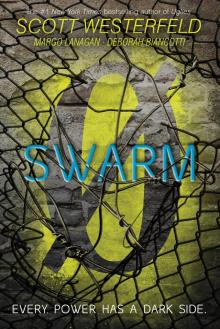 Swarm
Swarm Pretties
Pretties Zeroes
Zeroes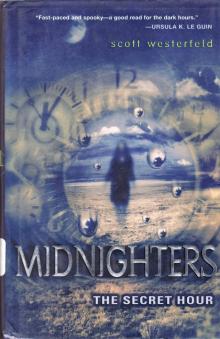 The Secret Hour
The Secret Hour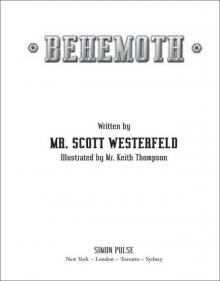 Behemoth
Behemoth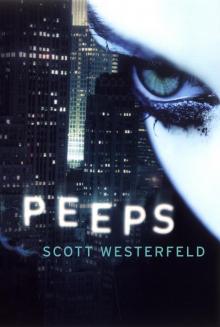 Peeps
Peeps Specials
Specials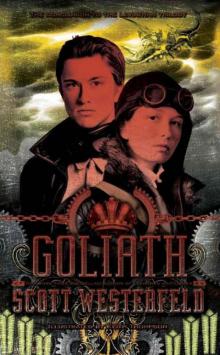 Goliath
Goliath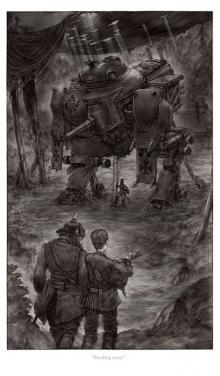 Leviathan
Leviathan Extras
Extras Shatter City
Shatter City The Risen Empire
The Risen Empire Touching Darkness
Touching Darkness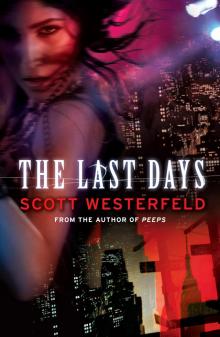 The Last Days
The Last Days So Yesterday
So Yesterday The Killing of Worlds
The Killing of Worlds Afterworlds
Afterworlds Mirror's Edge
Mirror's Edge Evolution's Darling
Evolution's Darling Blue Noon m-3
Blue Noon m-3 Touching Darkness m-2
Touching Darkness m-2 Impostors
Impostors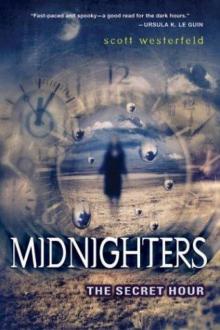 The Secret Hour m-1
The Secret Hour m-1 Leviathan 01 - Leviathan
Leviathan 01 - Leviathan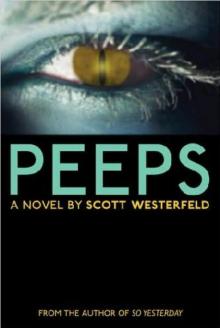 Peeps p-1
Peeps p-1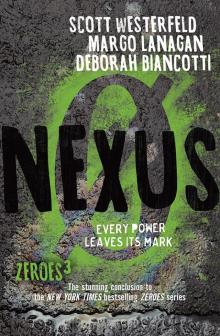 Nexus
Nexus Horizon
Horizon Bogus to Bubbly
Bogus to Bubbly Goliath l-3
Goliath l-3 The Last Days p-2
The Last Days p-2 Behemoth l-2
Behemoth l-2 Stupid Perfect World
Stupid Perfect World Goliath (Leviathan Trilogy)
Goliath (Leviathan Trilogy)